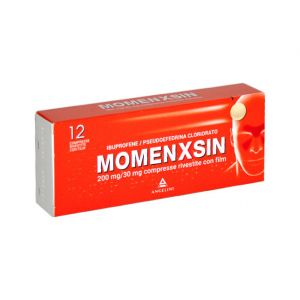Ship in Europe, Find out rates!
Momenxsin 200mg Ibuprofen + 30mg Pseudofedrine Hydrochloride 12 Tablets

- box Delivery in Italy in 24/48 and free returns
- star3.000+ positive reviews
- dropboxOver 60,000 products in the catalog
Film-coated tablets for oral use based on ibuprofen and pseudoephedrine hydrochloride .
Therapeutic indications
Symptomatic treatment of nasal congestion associated with acute rhinosinusitis of suspected viral origin with headache and / or fever. Momenxsin is indicated in adults and adolescents aged 15 years and over.
Dosage and posology
- Adults and adolescents aged 15 years and over
1 tablet (equivalent to 200 mg of ibuprofen and 30 mg of pseudoephedrine hydrochloride) every 6 hours as needed. In case of more intense symptoms, 2 tablets (equivalent to 400 mg of ibuprofen and 60 mg of pseudoephedrine hydrochloride) every 6 hours if necessary, up to a maximum total daily dose of 6 tablets (equivalent to 1200 mg of ibuprofen and 180 mg of pseudoephedrine hydrochloride). Do not exceed the maximum total daily dose of 6 tablets (equivalent to 1200 mg of ibuprofen and 180 mg of pseudoephedrine hydrochloride). For short term use. If symptoms worsen, consult a doctor. The maximum duration of treatment is 4 days for adults and 3 days for adolescents aged 15 years and over. In cases where the symptoms consist mainly of pain / fever or nasal congestion, administration of a product containing a single active ingredient is preferable. Undesirable effects can be minimized by using the lowest dose necessary to achieve symptom control for the shortest time possible (see section 4.4).
- Pediatric population
Momenxsin is contraindicated in pediatric patients less than 15 years of age.
Method of administration
For oral use. The tablets should be swallowed whole and not chewed, with a glass of water, preferably with meals.
Overdose
The clinical effects of overdose are more likely due to the presence of pseudoephedrine hydrochloride in this product rather than ibuprofen. The effects are not clearly related to the dose taken due to the different sensitivity of the various individuals to sympathomimetic properties.
Symptoms due to the sympathomimetic effect
CNS depression: e.g. sedation, apnea, cyanosis, coma CNS stimulation (more likely in children): e.g. insomnia, hallucinations, convulsions, tremors. In addition to the symptoms already mentioned as side effects, the following symptoms may occur: hypertensive crisis, cardiac arrhythmias, muscle weakness and tension, euphoria, excitement, thirst, chest pain, dizziness, tinnitus, ataxia, blurred vision, hypotension.
Symptoms related to ibuprofen (in addition to the gastrointestinal and neurological ones already mentioned as side effects)
Somnolence, nystagmus, tinnitus, hypotension, metabolic acidosis, loss of consciousness.
Therapeutic measures
There are no specific antidotes available. If the patient presents within one hour of taking a potentially toxic amount of drug, oral activated charcoal may be considered. An electrolyte check and an ECG are also needed. In the event of cardiovascular instability and / or symptomatic electrolyte imbalance, symptomatic treatment should be initiated.
Contraindications
Momenxin is an over-the-counter drug that is contraindicated in the following cases:
- Hypersensitivity to ibuprofen, pseudoephedrine hydrochloride or to any of the excipients
- Patients under 15 years of age
- Women in the third trimester of pregnancy
- Breastfeeding women
- Patients with a history of hypersensitivity reactions (e.g. bronchospasm, asthma, rhinitis, angioedema or urticaria) associated with acetylsalicylic acid or other non-steroidal anti-inflammatory drugs (NSAIDs)
- History of gastrointestinal bleeding or perforation associated with previous NSAID therapy
- Current or past recurrent peptic ulcer / haemorrhage (at least two distinct episodes of ulceration or bleeding demonstrated)
- Cerebrovascular or other bleeding
- Hematopoietic anomalies of unknown origin
- Severe hepatic insufficiency
- Severe renal insufficiency
- Severe heart failure
- Severe cardiovascular disorders, coronary heart disease (heart disease, hypertension, angina pectoris), tachycardia, hyperthyroidism, diabetes, pheochromocytoma
- History of stroke or presence of risk factors for stroke (due to α – sympathomimetic activity of pseudoephedrine hydrochloride)
- Closed-angle glaucoma risk
- Risk of urinary retention related to urethroprostatic disorders
- History of myocardial infarction
- History of seizures
- Systemic lupus erythematosus
- Concomitant use of other vasoconstrictors such as nasal decongestants, administered orally or nasally (e.g. phenylpropanolamine, phenylephrine and ephedrine), and methylphenidate
- Concomitant use of non-selective monoamine oxidase inhibitors (MAOIs) (iproniazid) or use of monoamine oxidase inhibitors within the last two weeks.
Side effects
The most commonly observed adverse reactions related to ibuprofen are gastrointestinal in nature. Peptic ulcers, perforation or gastrointestinal bleeding, possibly fatal, may occur, particularly in the elderly. Nausea, vomiting, diarrhea, flatulence, constipation, dyspepsia, abdominal pain, melaena, haematemesis, ulcerative stomatitis, exacerbation of colitis and Crohn's disease have been reported following its administration. Gastritis was reported less frequently. In general, the risk of experiencing adverse reactions (particularly serious gastrointestinal complications) increases with increasing dose and duration of treatment. Hypersensitivity reactions have been reported following treatment with ibuprofen, which may include: (a) non-specific allergic reactions and anaphylaxis (b) respiratory tract reactivity, including asthma, aggravated asthma, bronchospasm or dyspnoea (c) various skin disorders, including skin rashes of various kinds, pruritus, urticaria, purpura, angioedema and, more rarely, exfoliative and bullous dermatoses (including epidermal necrolysis and erythema multiforme) In patients with ongoing autoimmune disorders (such as systemic lupus erythematosus or mixed connective tissue disease ), isolated cases of aseptic meningitis symptoms such as neck stiffness, headache, nausea, vomiting, fever or disorientation have been observed during treatment with ibuprofen. Edema, hypertension and heart failure have been reported in association with the use of NSAIDs. Clinical studies suggest that the use of ibuprofen, especially at high doses (2400 mg / day), may be associated with a slightly increased risk of arterial thrombotic events (e.g. myocardial infarction or stroke).
Pregnancy and breastfeeding
- Pregnancy
Pseudoephedrine hydrochloride Animal studies have shown reproductive toxicity. The use of pseudoephedrine hydrochloride reduces the uterine blood flow of the mother, but clinical data on the effects on pregnancy are insufficient. Ibuprofen Inhibition of prostaglandin synthesis may adversely affect pregnancy and / or embryonic / fetal development. Results of epidemiological studies suggest an increased risk of miscarriage, cardiac malformation and gastroschisis following the use of prostaglandin synthesis inhibitors in early pregnancy. The risk is believed to increase with dose and duration of therapy. Administration of a prostaglandin synthesis inhibitor has been shown to cause increased pre- and post-implantation losses and embryonic / fetal lethality in animals. In addition, an increased incidence of various malformations, including cardiovascular malformations, has been reported in animals administered a prostaglandin synthesis inhibitor during the organogenetic period. During the first and second trimester of pregnancy, ibuprofen should not be administered unless strictly necessary. If a woman attempting to conceive or in the first or second trimester of pregnancy is to take ibuprofen, the dose and duration of treatment should be kept as low as possible. During the third trimester of pregnancy, all prostaglandin synthesis inhibitors can expose the fetus to: - cardiopulmonary toxicity (with premature closure of the arterial duct and pulmonary hypertension); - renal dysfunction, which can progress to renal failure with oligohydramnios; the mother and the child, at the end of pregnancy : - possible prolongation of the bleeding time, an antiplatelet effect that can occur even at very low doses; - inhibition of uterine contractions with consequent delay or prolongation of labor. Consequently this medicinal product is: contraindicated in the third trimester of pregnancy and should only be administered as strictly necessary in the first and second trimester.
- Feeding time
The need to take measures during breastfeeding stems from the presence of pseudoephedrine hydrochloride in the drug formulation: pseudoephedrine hydrochloride is excreted in breast milk. Taking into account the potential cardiovascular and neurological effects of vasoconstrictors, the use of this medicinal product is contraindicated during breastfeeding. Fertility There is evidence that cyclo-oxygenase / prostaglandin synthesis inhibitors may impair female fertility by affecting ovulation. The effect is reversible upon discontinuation of treatment.
Special warnings
The concomitant use of Momenxsin and other NSAIDs, including selective cyclo-oxygenase (COX) -2 inhibitors, should be avoided. Side effects can be reduced by using the lowest effective dose needed to control symptoms for the shortest time possible. If symptoms persist beyond the maximum recommended duration of treatment with this medicine (4 days for adults and 3 days for adolescents), measures to be taken, in particular the possible usefulness of antibiotic treatment, should be re-evaluated. Acute rhinosinusitis of suspected viral origin is defined as a series of bilateral rhinological symptoms of moderate intensity, dominated by nasal congestion with severe or purulent rhinorrhea, which occurs in an epidemic setting. The purulent appearance of rhinorrhea is common and does not consistently correspond to bacterial superinfection. Sinus pain in the first days of the disease is associated with congestion of the relative mucosa (acute congestive rhinosinusitis) and in most cases resolves spontaneously. In case of acute bacterial sinusitis, the use of antibiotic therapy is justified.
Special warnings related to pseudoephedrine hydrochloride
The posology, the maximum recommended duration of treatment (4 days for adults and 3 days for adolescents) and contraindications must be strictly observed. Patients should be advised that treatment should be discontinued if hypertension, tachycardia, palpitations, cardiac arrhythmias, nausea or any neurological signs such as the onset or worsening of headache occur. Before using this medicine, patients should consult their doctor in case of:
- hypertension, heart disease, hyperthyroidism, psychosis, or diabetes;
- concomitant intake of anti-migraine drugs, in particular vasoconstrictors based on ergot alkaloids (due to the α – sympathomimetic activity of pseudoephedrine);
- mixed connective tissue disease: increased risk of aseptic meningitis;
- Neurological symptoms such as seizures, hallucinations, behavioral disturbances, agitation and insomnia have been described following systemic administration of vasoconstrictors, especially during febrile episodes or in case of overdose. Such symptoms were reported more commonly in the pediatric population.
Therefore it is appropriate:
- avoid the administration of Momenxsin in combination with drugs that can lower the epileptogenic threshold, such as terpene derivatives, clobutinol, atropine-like substances and local anesthetics, or in the presence of a history of seizures;
- strictly adhere to the recommended posology in all cases and inform patients of the risks of overdose if Momenxsin is taken concomitantly with other vasoconstrictor-containing medicinal products. Patients with urethroprostatic disorders are more prone to developing symptoms such as dysuria and urinary retention. Elderly patients may be more sensitive to central nervous system (CNS) effects.
Usage precautions related to pseudoephedrine hydrochloride
In patients undergoing scheduled surgery where halogenated volatile anesthetics are planned, it is preferable to discontinue treatment with Momenxsin several days prior to surgery, given the risk of acute hypertension. Athletes should be advised that treatment with pseudoephedrine hydrochloride may result in positive doping tests. Interference with serological testing Pseudoephedrine has the potential to reduce iobenguane i-131 uptake in neuroendocrine tumors, thereby interfering with scintigraphy.
Special warnings regarding ibuprofen
Bronchospasm may occur in patients suffering from bronchial asthma or allergic diseases or with a history of such conditions. In case of asthma, the product should not be taken without first consulting a doctor. Patients with asthma associated with chronic rhinitis, chronic sinusitis and / or nasal polyposis are at an increased risk of allergic reactions when taking acetylsalicylic acid and / or NSAIDs. Administration of Momenxsin may trigger an acute asthma attack, particularly in some patients allergic to acetylsalicylic acid or to an NSAID. Prolonged use of any type of pain reliever for headache can cause them to worsen. If this situation is found or suspected, medical advice should be sought and treatment discontinued. The diagnosis of drug overuse headache (MOH) should be suspected in patients who experience frequent or daily headaches despite (or due to) regular use of headache medications. Before using this medicine, patients suffering from blood clotting disorders should consult their doctor.
Gastrointestinal Effects:
Gastrointestinal bleeding, ulceration or perforation, sometimes fatal, has been reported at any stage of treatment with the use of all NSAIDs, with or without warning symptoms or previous gastrointestinal events. The risk of gastrointestinal bleeding, ulceration or perforation, sometimes fatal, increases the higher the dose of NSAIDs, in patients with a history of ulcer, particularly if complicated with bleeding or perforation, and in the elderly. These patients should start treatment with the lowest available dose. For these patients and for those taking concomitant treatment with low dose acetylsalicylic acid or other medicinal products that may increase the risk of gastrointestinal events, combination therapy with gastroprotectors (e.g. misoprostol or proton pump inhibitors) should be considered. . Patients with a history of gastrointestinal toxicity, particularly the elderly, should report any unusual abdominal symptoms (particularly gastrointestinal bleeding), especially in the early stages of treatment. Particular caution is advised in patients being treated concomitantly with drugs that may increase the risk of ulceration or bleeding, such as oral corticosteroids, anticoagulants such as warfarin, selective serotonin reuptake inhibitors (SSRIs) or antiplatelet agents such as acetylsalicylic acid. Treatment with Momenxsin should be discontinued immediately in case of gastrointestinal bleeding or ulceration. NSAIDs should be administered with caution to patients with a history of gastrointestinal disease (ulcerative colitis, Crohn's disease), as these conditions may be exacerbated. In case of concomitant alcohol intake, the use of NSAIDs may increase undesirable effects related to the active substance, especially those affecting the gastrointestinal tract or the central nervous system.
Cardiovascular and cerebrovascular effects
The following conditions are subject to contraindications due to the presence of pseudoephedrine hydrochloride: severe cardiovascular disorders, coronary heart disease (heart disease, hypertension, angina pectoris), tachycardia, hyperthyroidism, diabetes, pheochromocytoma, history of stroke or the presence of risk factors for the stroke, history of myocardial infarction. Clinical studies suggest that the use of ibuprofen, particularly at high doses (2400 mg / day), may be associated with a slightly increased risk of arterial thrombotic events (e.g. myocardial infarction or stroke). Overall, epidemiological studies do not suggest that low dose ibuprofen (e.g. ≤ 1200 mg / day) is associated with an increased risk of arterial thrombotic events. Patients with uncontrolled hypertension, heart failure (NYHA II – III), established ischemic heart disease, peripheral arterial disease and / or cerebrovascular disorders should only be treated with ibuprofen after careful consideration and high doses (2400 mg / day) should be avoided. Careful consideration should also be made before patients with risk factors for cardiovascular events (e.g. hypertension, hyperlipidaemia, diabetes mellitus, smoking) undertake long-term treatment, particularly if high doses of ibuprofen (2400 mg / day).
Skin reactions
Serious skin reactions, some of them fatal, including exfoliative dermatitis, Stevens – Johnson syndrome and toxic epidermal necrolysis, have been reported very rarely in association with the use of NSAIDs. In the early stages of therapy, patients appear to be at higher risk for these reactions: the onset of the reaction occurs in most cases within the first month of treatment. Momenxsin should be discontinued at the first appearance of a rash, mucosal lesions or any other signs of hypersensitivity.
Usage precautions related to ibuprofen
Elderly: The pharmacokinetics of ibuprofen are not affected by age, therefore no dosage adjustments are required in the elderly. However, elderly patients should be carefully monitored, as they are more sensitive to NSAID-related undesirable effects, in particular gastrointestinal bleeding and perforation, which can be fatal. Caution and special monitoring are required when administering ibuprofen to patients with a history of gastrointestinal disease (such as peptic ulcer, hiatus hernia or gastrointestinal haemorrhage). In the initial stages of treatment, careful monitoring of diuresis and renal function is necessary in patients with heart failure, in patients with chronic renal or hepatic impairment, in patients taking diuretics, in patients hypovolaemic due to surgery major and, in particular, in elderly patients. Dehydrated adolescents are at risk of kidney damage. In case of visual disturbances during the course of treatment, the patient should undergo a complete ophthalmological examination.
Expiry and Retention
Keep this medicine out of the sight and reach of children. Do not use this medicine after the expiry date which is stated on the carton or blister after EXP. The expiry date refers to the last day of the month. Do not store above 30 ° C. Do not throw any medicines via wastewater or household waste. Ask your pharmacist how to throw away medicines you no longer use. This will help protect the environment.
Composition
Each film-coated tablet of Momenxin contains:
Active principles
200 mg of ibuprofen and 30 mg of pseudoephedrine hydrochloride.
Excipients
Tablet core Microcrystalline cellulose Calcium hydrogen phosphate anhydrous Croscarmellose sodium Maize starch Silica, colloidal anhydrous Magnesium stearate Tablet coating Hypromellose Macrogol 400 Talc Titanium dioxide (E171) Iron oxide yellow (E172)


